In this interview, SevenPonds speaks with Stephanie Howard, Residence Service Director of Regency of Evergreen Valley in San Jose. Recently, SevenPonds CEO Suzette Sherman heard Stephanie address professionals and family members about ways to reach patients who struggle with dementia. The expertise, energy, and compassion Stephanie conveyed compelled Suzette to invite her to talk with me today.
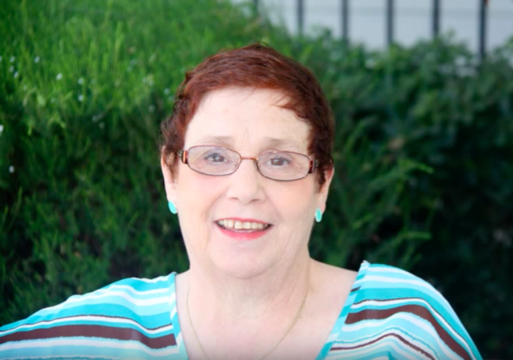 In her Army days Stephanie was responsible for the evacuation and care of wounded soldiers during the Vietnam War. She married and continued to serve until she became pregnant, making her (in those days) ineligible to serve. In 1976 her 5-year-old son Tucky was diagnosed with the United States’ first reported case of Reye’s Syndrome, a rare and often fatal virus disease that attacks the brain and liver. She has cared for him ever since.
In her Army days Stephanie was responsible for the evacuation and care of wounded soldiers during the Vietnam War. She married and continued to serve until she became pregnant, making her (in those days) ineligible to serve. In 1976 her 5-year-old son Tucky was diagnosed with the United States’ first reported case of Reye’s Syndrome, a rare and often fatal virus disease that attacks the brain and liver. She has cared for him ever since.
With an interest in brain function inspired by Tucky’s illness, Stephanie began working with the elderly 15 years ago, serving as director at Regency of Evergreen Valley for the last 5 years. In 2013 she received the California Assisted Living Association (CALA) Outstanding Department Director award.
Editor’s note: This interview has been edited for length and clarity.
Laura Hayden: My mother suffered from frontal lobe dementia. When I finally found a facility that deliberately added a touch of quality to her day, that helped the both of us. How can caregivers improve the quality of their loved one’s day?
Stephanie Howard: All patients struggling with dementia care about is love, respect, dignity, and choice. You put those four things in place and they have a better life than us at times. Things are heavy duty “out there,” but they don’t need to be there. The world is smaller for them.
Laura: What do you mean by smaller?
Stephanie: Just that all the things that they used to do — or that you think that they should do — are more about you than the patient. I always tell caregivers that for the person struggling with dementia:
What was, was.
What is, is.
The ‘was’ is gone,
But there’s nothing wrong
with making the ‘is’
the best ‘is’ it ever was.
That’s the focus of our program — for the patients to live their lives the best that they can for the time that they’ve got –not to try to live it the way it used to be just because it once was like that. And we don’t put them in a Pull-Up (diaper), stick them in a chair and fill them with a bunch of medication.
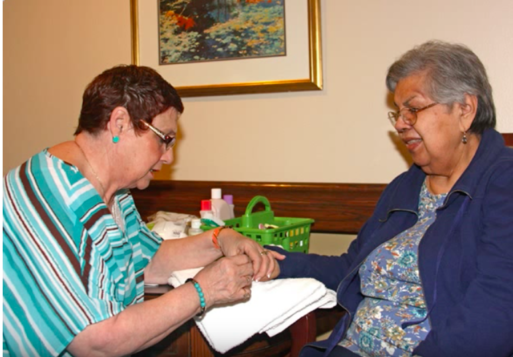
Credit: California Assisted Living Association/youtube
Laura: How can we enter and participate in their smaller world?
Stephanie: Communication is the key to success with our residents. Sometimes their minds are going 100 mph and sometimes their minds are going very slow. So the ability to have a conversation with them means a lot. If they are having a catastrophic day, we don’t pick that day to try to calm them down. That’s not where they are at. You may feel it’s your time to get that done, but it’s not their time to do that.
Laura: Are there better ways to communicate than others?
Stephanie: Let me tell you about the 12-inch window. If you want something from your husband, you give him the 12-inch window. If you want something from the baby or the puppy, you give them the 12-inch window. You move in close, look straight into their eyes, and speak to them.
Laura: And that’s the 12-inch window?
Stephanie: That’s the 12-inch window. You don’t holler 20 feet across the room, “Anne have you taken all your medication? And how are you feeling? How’s that new aide doing?” That just gets Anne looking around the room wondering where all that noise is coming from. And no one gets the answers they’re looking for. They just think Anne’s getting worse and decide to stuff her with more meds. That’s not what it’s all about.
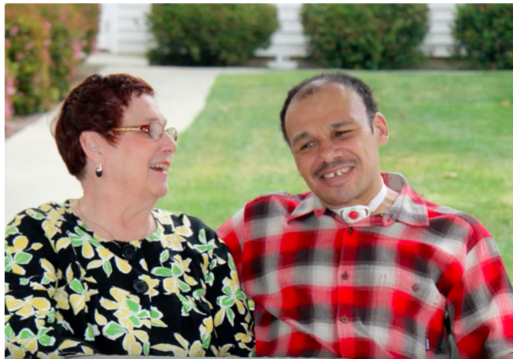
Stephanie Howard with her son Tucky.
Credit: California Assisted Living
Association/youtube
Laura: It sounds as if your program at Regency emphasizes the respect and dignity afforded the patient you spoke of earlier.
Stephanie: I feel that way. But I want to say something to you. It’s not about a person. It’s about a team. I could do nothing without the staff. My average staffer has been here for 15 years. They know the resident’s rights. They like to be able to practice that.
And that’s one of my enforcements. Many years ago when I took over the building, I had a 295-pound lady who hadn’t gotten out of bed in two years. When I walked into the dementia ward at night the staff was taking chairs and putting them under the door knobs so that the residents wouldn’t come out at night. They were running it as a skilled nursing facility. I had to take it from 87 percent occupancy to 52 percent because the residents weren’t getting the care they needed. The staff was all task oriented. They weren’t into person-centered care.
Laura: How long did it take to achieve a person-centered care culture?
Stephanie: I struggled for a year and I worked very hard to get the stabilization of the staff we have to work with the program. And now I have a quiz that I give applicants that tells me before I hire them whether they have the ability to do this or not.
Laura Hayden: Last week you emphasized how important eye-to-eye contact is when communicating with a person struggling with dementia. How else can we connect with them more effectively?
Stephanie Howard: First of all, the more you know about the person the better. Here at Regency we create a document we call the life journey to help us get to know our residents in memory care. It’s a six-page history of just that — their memories — including personal interests and hobbies. I actually started using it with my assisted living residents too because many of them have a touch of MCI (mild cognitive impairment).
Laura: Six pages must cover a lot of their past. Once you’ve gathered this information, how do you use it?
Stephanie: Take my Helen for instance. Six months ago, based on the information collected in her life journey, we put a picture in front of her and within 3 minutes she drew that picture to a T. Right now we are featuring a show of her work in the library.
Laura: That’s a remarkable story. How did her family react to this talent you uncovered in her life journey?
Stephanie: They cried tears of joy for two days! They didn’t even realize she could still draw. They thought that was gone by this point in her disease. Yet, just by putting something in front of her, based on what we knew about her past, we got results.
Laura: So revisiting the past and pastimes can have positive effects?
Stephanie: By all means. You don’t want to start a visit with, ”Hi Mom, How are you today? Did you eat your breakfast? Let’s comb your hair.” Mom may be sitting there trying to remember just who is in front of her. Bring something with you – a photograph, some music. They all remember the words to songs they grew up and grew older with. Bring something they understand. That’ll convey the message that you want them to feel comfortable.
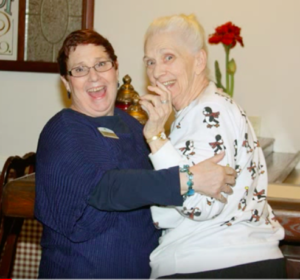
Stephanie is a favorite among the residents
at Regency Evergreen
Credit: CALA/youtube
Laura: Is it always a good idea to bring up the past?
Stephanie: It depends on the level of illness — on where they are at with that memory. You don’t want to bring up something that they are going to keep on forgetting. Don’t set them up for failure by putting them in the right church but the wrong pew. It’ll only upset them to dwell on what they can’t remember or maybe don’t even know. Not everybody plays cards.
Laura: And what if they do get upset?
Stephanie: When our memory care residents are having a really bad day, we find something in their life journey that will redirect the conversation to something they do remember. They love that. Recently, for one resident, it was rollerskating. People don’t even use the word rollerskating anymore but she understood rollerskating.
Laura: You’ve given us good advice on what we should do — like using the 12-inch window when speaking and sharing past experiences.What should we avoid doing?
Stephanie: Four years ago I became quite frustrated with my assisted living residents with MCI. All of a sudden we weren’t seeing much of them. They were in their apartments watching the stupid boob tube. Television is not the right activity — it overstimulates. First Harry’s kissing Sally…then there’s a car going off the bridge…and next a Twinkies commercial comes on. The MCIs and memory care patients are still back at Harry kissing Sally trying to make sense of what’s going on.
Laura: That advice would definitely add quality to all our lives — all screens included. Are there other pitfalls we should be aware of?
Stephanie: It’s important, especially if the person is high functioning, not to treat them like children. And when appropriate, let them make their own decisions. Recently one of my residents got married. People said, “They can’t do that.” Well, yes they can! They still have their rights. And they loved each other. It was a beautiful wedding — a fake wedding — but to them, they met their needs for themselves. They cuddle each other every night and love each other very much.
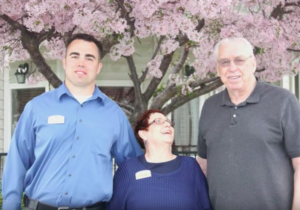
Stephanie flanked by a resident on her right and
his son, who works with her.
Credit: CALA/youtube
Laura: Is there something you’d like to add that I may not have asked you?
Stephanie: When I talk to the families of my residents and family caregivers I always ask them, “Are we going to talk about how the disease is affecting you or how it’s affecting your loved one?” These are two totally separate issues. The decisions they make are going to affect their loved ones more than anything else they’ve ever done in their lives, because this is the end of their lives. It’s their loved one’s journey – not theirs..
Like I said earlier, all elderly suffering with dementia want is love, respect, dignity and choice. Yes, dementia is a terrible thing, but so is cancer, COPD, diabetes, and other maladies. We can’t get out of this place without having something. But you can make dementia less stressful for your loved one by understanding the small world the patient operates in from one day or one hour or one moment to the next, and adjusting your interaction with them accordingly.
Laura: Thanks so much for speaking with us Stephanie.You’ve given me an insightful view of how to better connect with people struggling with dementia.

 How Can We Better Reach People Who Struggle With Dementia?
How Can We Better Reach People Who Struggle With Dementia?


 First the Wealth Gap, Now the U.S. Has a Growing Health Gap
First the Wealth Gap, Now the U.S. Has a Growing Health Gap

 Our Annual Seven Holiday Gifts for Someone Who Is Grieving, 2024 Edition
Our Annual Seven Holiday Gifts for Someone Who Is Grieving, 2024 Edition














